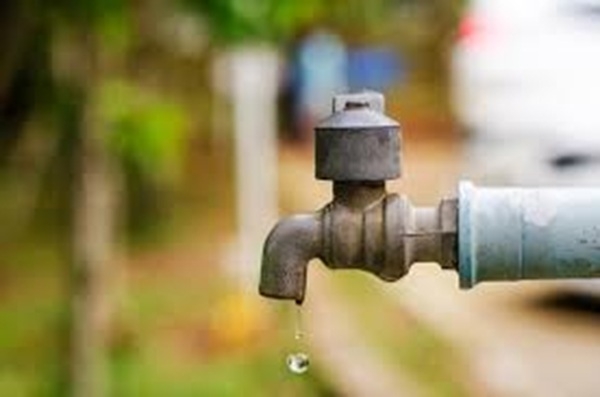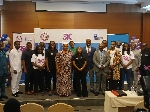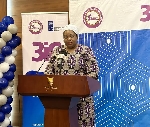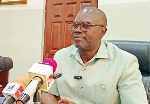Ghana Water cites 2,700 illegal connections in Accra-Tema metropolitan areas
 Pipe water
Pipe water
Ghana Water Limited (GWL) has launched an aggressive nationwide campaign to clamp down on illegal water connections as the country grapples with a rising wave of water theft.
The utility company says the growing use of potable water through unauthorised means is not only draining its finances but also undermining service delivery, stressing infrastructure, and disrupting equitable distribution.
From bypassing meters and direct tapping into pipelines to the installation of illegal inline pumps and widespread meter theft, the company has witnessed a sharp surge in unlawful activities—particularly from late 2024 through mid-2025.
These developments have prompted GWL to intensify its revenue protection and enforcement operations across all regions.
In the Accra-Tema Metropolitan Area alone, more than 2,700 illegal connections were uncovered between the fourth quarter of 2024 and the first quarter of 2025.
These included unauthorised service lines, reconnections by defaulting customers after disconnection, and meter bypasses.
One striking case involved a property near Ritz Junction on Agbogba Road, where only one of three water service lines was metered.
The remaining two supplied commercial tanker operators via underground reservoirs concealed behind a wall—effectively evading billing systems.
“This is a deliberate act that directly undermines our revenue recovery and compromises our ability to ensure fair distribution,” said Ing. Dr. Hadisu Alhassan, Regional Production Manager for the Accra-Tema area.
He praised the Board Chairman, Mr. Eric Biliguo Adama, for his hands-on leadership during the inspection that uncovered the Agbogba case.
Beyond illegal connections, GWL is also contending with rampant meter theft, which is fast becoming a nationwide menace.
Since the start of 2025, thousands of water meters—especially costly ultrasonic types—have been stolen across the country.
“Meter theft is not a petty crime. It creates unaccounted-for water losses and disrupts service to households,” said Mr Adam Mutawakilu, Managing Director of GWL.
“It has serious financial and operational implications.”
The company is collaborating with the Ghana Police Service to investigate and prosecute offenders.
Some of the thefts are believed to be coordinated by organised syndicates targeting high-value service areas.
GWL’s regional teams are taking swift action.
In Accra West, over 800 users who failed to regularise their services during a grace period are now facing legal action.
“We gave sufficient time for compliance, and many responded. But those who ignored our notices must now face the law,” said Ms. Solace Akomeah, PR and Communications Manager for the region.
Similar cases have emerged in the Accra East Region, where growing numbers of bypassed meters and unauthorised extensions have led to intermittent service and inefficiencies in planning.
In the Ashanti Region, five individuals were recently arrested in areas including Denyame, Dakodwom, Kwadaso Estate, and Santasi Apire.
All were found to have unlawfully tapped into GWL pipelines and have since been surcharged.
“Illegal connections reduce our revenue, derail planned projects, and deprive others of access,” said Mr. Padi Kwabena Narh, the region’s Communications Officer.
“This campaign is ongoing, and we are resolute in rooting out these violations.”
In Tamale, a court fined a 50-year-old businessman, Mr. Ibrahim Baako Alhassan, GHS 3,600 or a 12-month prison term for illegally installing inline pumps.
He was also ordered to sign a bond of good behaviour—a signal of GWL’s readiness to prosecute.
While pursuing external offenders, GWL is also cleaning house.
The company has vowed to investigate all instances of internal collusion and apply appropriate sanctions.
“In the Agbogba case, where staff complicity is suspected, we are working with security agencies to uncover the truth,” Mr Mutawakilu stated. “
Any employee found culpable will face both administrative and legal consequences.”
He added that GWL is actively calculating the financial implications of all detected illegalities as part of its broader loss recovery plan.
GWL believes the long-term solution lies in public education and community partnerships.
The company has scaled up awareness campaigns to inform citizens about the dangers and consequences of illegal connections.
“Water is a national resource. Every illegal tap affects the system as a whole,” said Mr. Mutawakilu.
“We urge the public to report suspicious activities and assist us in protecting the network.”
To this end, GWL is exploring incentive schemes to reward whistleblowers in hotspot areas and empower communities to monitor their own networks.
Despite the challenges, GWL remains optimistic.
Plans are underway to invest in smart metering, digital billing, upgraded infrastructure, and improved leakage control systems.
“Our focus isn’t just on enforcement,” Mr. Mutawakilu said. “We are committed to building a smarter, more resilient water system that ensures fairness, sustainability, and better service for all.”
He concluded with a nationwide call to action: “Illegal water use undermines national progress.
This is a fight we cannot win alone. We need citizens, community leaders, the media, and policymakers to rally behind us.”
Source: Classfmonline.com/Cecil Mensah
Trending Business

Agri-Impact and Israeli Embassy host agribusiness innovation forum in Accra
17:00
Tema port stakeholders welcome BoG’s exchange rate transparency directive
09:34
NIC commissioner rallies insurance stakeholders to support informal sector and youth innovation
08:06
Dr. Amina Sammo champions inclusive insurance as a tool for development at UNDP-NIC 3ic demo day
03:10
Ghana’s economy records strong performance in first-half of 2025
12:54
Ghana Water cites 2,700 illegal connections in Accra-Tema metropolitan areas
12:27
Road contractors' unpaid debts claim lives amid financial strain-GPRCA reveals
11:26
Western Regional House of Chiefs applauds cedi recovery
11:30
TDC Ghana warns rent defaulters in Tema
15:11
Business leaders share blueprint for entrepreneurial success at COA Initiative
16:57




